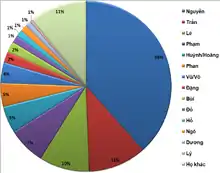Nguyen
Nguyễn is the most common Vietnamese family name. Outside of Vietnam, the surname is commonly rendered without diacritics as Nguyen, and less commonly as Nguyên. Vietnamese pronunciations between south and north are similar, except for the distinct tone between the two dialects.[1]
 Chữ Hán for Nguyễn | |
| Pronunciation | [wɪn] (English), or [ŋwiə̯n˧ˀ˥] (Northern Vietnamese) or [ŋwiə̯ŋ˧˩˧] (Southern Vietnamese) |
|---|---|
| Language(s) | Vietnamese |
| Other names | |
| Variant form(s) | Ruan |
By some estimates forty percent of Vietnamese people bear this surname.[2][3][4]
Origin and usage
Nguyễn is the Vietnamese transliteration of the Chinese surname 阮.[5] Nguyen stems from the Chinese word ruan (a string instrument that is plucked).[6] Like many surnames in Vietnam and other Chinese-influenced cultures, the surname Nguyễn is shared with other countries in the Sinosphere:[1] the same surname is often transliterated as Ruan in Mandarin, Yuen in Cantonese,[7] Gnieuh or Nyoe¹ /ɲɥø˩˧/ in Wu Chinese, or Nguang in Hokchew.
The first Nguyen known in Vietnam was in 317 CE. Nguyễn Phu , an Eastern Jin Dynasty officer and his family migrated to Jiaozhou. Many events in Vietnamese history have contributed to the name’s prominence. In 1232, after usurping the Lý Dynasty, Trần Thủ Độ forced the descendants of the Lý to change their surname to Nguyễn. When Hồ Quý Ly overturned the Trần Dynasty, he killed many of their descendants so when the Hồ Dynasty collapsed in 1407, many of his descendants changed their surname to Nguyễn in fear of retribution. In 1592, on the collapse of the Mạc Dynasty, their descendants changed their surname to Nguyễn. In late 16th century, the Tư Mã clan from Thanh Hóa changed to Nguyễn and settled in Cochinchina. When the Nguyễn Dynasty (the descendants of the Nguyễn Lords) took power in 1802, some of the descendants of the Trịnh Lords fearing retribution changed their surname to Nguyễn, while others fled north into China. The Nguyễn Dynasty awarded many people the surname Nguyễn during their rule, and many criminals also changed their surname to Nguyễn to avoid prosecution. As with other common surnames, people having this surname are not necessarily related.[1][2]
In Vietnamese custom as with other East Asian cultures, the surname precedes the given names.

Usage outside Vietnam
The prevalence of Nguyễn as a family name in Vietnam extends to outside the country, due to numerous and widespread Vietnamese emigrants. Outside Vietnam, the surname is commonly rendered without diacritics, as “Nguyen”. Nguyen is the seventh most common family name in Australia[8] (second only to Smith in Melbourne phone books[9]), and the 54th most common in France.[10] It is the 56th most common surname in Norway[11] and tops the foreign name list in the Czech Republic.[12]
In the United States, Nguyen is the 38th most-common surname and is shared by more than 437,000 individuals,[13] according to the 2010 Census; it was the 57th and 229th most-common surname, respectively, in the 2000[14] and 1990[15] censuses. It is also the most common exclusively East Asian surname.[16] It is ranked 124th in the U.S. Social Security Index.[17]
Subfamilies
In Vietnamese tradition, people are referred to by their personal names and not by their family names even in formal situations. Thus, there is not as much confusion about who is being referred to as one might expect. However, some groups distinguish themselves from other Nguyễn by passing elements of their names that are usually considered middle names to their children. This practice is more common with male than with female children. Some of the prominent subgroups within the Nguyễn family are, in no particular order:
- Nguyễn Phước or Nguyễn Phúc 阮福: Surname for the Nguyễn Lords family members, and all members of the Nguyễn dynasty emperors.
- Nguyễn Đình 阮廷
- Nguyễn Hữu 阮有
- Nguyễn Cảnh 阮景
- Nguyễn Khắc 阮克
- Nguyễn Tiến 阮進
- Nguyễn Đức 阮德
- Nguyễn Minh 阮明
- Nguyễn Thanh 阮清
- Nguyễn Ngọc 阮玉
- Nguyễn Văn 阮文
- Nguyễn Quang 阮光
- Nguyễn Xuân 阮春
- Nguyễn Huy 阮輝
- Nguyễn Hoàng 阮黃
- Tôn Thất 尊室(Tôn Nữ 尊女 for females): Surname for members of the Nguyễn Dynasty royal family that were not direct descendants of the Emperor.
Pronunciation
The Vietnamese pronunciation is [ŋwǐˀən] (![]() listen) in northern dialect or [ŋwĩəŋ] (
listen) in northern dialect or [ŋwĩəŋ] (![]() listen) in southern dialect, in both cases, in one syllable. [ŋ] is the velar nasal found in the middle of the English word “singer”.[18] Unlike in Vietnamese, this consonant is never found in initial position in English. [w] is the semivowel found in the English word “win”. [iə] is a rising diphthong. Its sound of this diphthong is similar to the diphthong /ɪə/ found in British English Received Pronunciation in the word “ear”. Finally, [n] occurs in the English word “net”.
listen) in southern dialect, in both cases, in one syllable. [ŋ] is the velar nasal found in the middle of the English word “singer”.[18] Unlike in Vietnamese, this consonant is never found in initial position in English. [w] is the semivowel found in the English word “win”. [iə] is a rising diphthong. Its sound of this diphthong is similar to the diphthong /ɪə/ found in British English Received Pronunciation in the word “ear”. Finally, [n] occurs in the English word “net”.
However, Nguyễn is also pronounced with a tone in Vietnamese. In Southern Vietnam, Nguyễn is pronounced with the dipping tone: the pitch of the voice first drops from a mid-level to the bottom of the speaker’s range of pitch and then rises back to mid. In Northern Vietnam, it is pronounced with the creaky rising tone: the pitch of the voice rises from mid-level to the top of the speaker’s range of pitch, but with constricted vocal cords, akin to a glottal stop in the middle of the vowel. See Vietnamese tones.
Common pronunciations by English speakers include [wɪn][19][20] and [nuːˈjɛn].
Changes of family name
There have been various points in Vietnam's history at which people have changed their family name to "Nguyễn." When the Lý Dynasty fell in 1232, Trần Thủ Độ, who orchestrated the overthrow of it, forced Lý's descendants to adopt the name due to the naming taboo of Trần Lý, grandfather to emperor Trần Cảnh.
During 1000 years, from 457 to Hồ Quý Ly, in Hải Dương and a part of Haiphong today there is the district of the Phí family (Vietnamese: huyện Phí Gia). At the end of the Lý and the Trần Dynasty there were many people who had changed their names to "Nguyễn" and "Nguyễn Phí." By the Lê Dynasty, the court changed the name of the district to "Kim Thành."
When the Mạc Dynasty fell in 1592, their descendants changed their family name to "Nguyễn."
Trần Quang Diệu (like his wife Bùi Thị Xuân) worked as a major officer of the Tây Sơn Dynasty, against Nguyễn Ánh. After the Tây Sơn was defeated, his children adopted various names (one of them "Nguyễn") to flee retaliation.
Historically in Vietnam and many Asian countries, the rulers may let their courtiers share their family name as a reward for their loyalty. Many officials thereby changed their name to match that of the last Nguyễn dynasty. Civilians also adopted the name during the Trịnh–Nguyễn Civil War for purposes of social climbing, having migrated from the north to the south. Even the Tây Sơn Brothers changed their name to "Nguyễn" from "Hồ."
Notable people
Since approximately 40 percent of all Vietnamese people have the surname Nguyễn, notable people with this surname run the gamut of Vietnamese society. They range from heads of state (Nguyễn lords, Tây Sơn dynasty , Nguyễn Dynasty, Nguyễn Văn Thiệu, Nguyễn Minh Triết , Nguyễn Phú Trọng , Nguyễn Xí), poets (Nguyễn Trãi, Nguyễn Du, Nguyễn Đình Chiểu), Catholic clergymen (Nguyễn Văn Thuận), writers (Viet Thanh Nguyen), scientists, composers, actors (Dustin Nguyen), professional poker players (Scotty Nguyen), former professional American football player Dat Nguyen, current professional (USMNT)/(MLS) (LAFC) midfielder (Lee Nguyễn), to executed criminals (Nguyễn Tường Vân). Hồ Chí Minh was born Nguyễn Sinh Cung and used various names with the surname Nguyễn throughout his career (Nguyễn Tất Thành, Nguyễn Ái Quốc) and was not known as Hồ Chí Minh until late in his career.
References
- "Vietnam: Where saying 'I love you' is impossible". BBC News. 28 August 2013. Retrieved 2013-08-29.
Pronunciation is fiendishly tricky for foreigners with the combination of "ng", tricky vowels and unfamiliar tones. The best that most of us can manage is "nwee-yen" or even just "win".
- Lê Trung Hoa, Họ và tên người Việt Nam, NXB Khoa học - Xã hội, 2005
- "Vietnamese names". Archived from the original on July 1, 2008.
- Kelly, Maura (July 27, 2011). "Nafissatou and Amadou". Slate.
- "Why Are So Many Vietnamese People Named Nguyen?". IB Times.
- "Nguyen Name Meaning and Origin". About.com.
- "Why Are So Many Vietnamese People Named Nguyen?". International Business Times. February 18, 2014.
- The Age (2006-09-04). "Nguyens keeping up with the Joneses". Retrieved 2006-09-09.
- Melbourne City Council. "City of Melbourne - Multicultural Communities - Vietnamese". Archived from the original on 2006-10-04. Retrieved 2006-11-27.
- "Les noms de famille les plus portés France". www.journaldesfemmes.com.
- Statistics Norway. "Top 100 last names". Retrieved 2008-06-20.
- "Žebříčky nejčastějších jmen vedou Nováci a Nguyenové" (in Czech). Novinky. 2007-05-17. Retrieved 2007-11-07.
- "Frequently Occurring Surnames from the 2010 Census".
- "Frequently Occurring Surnames from the 2000 Census".
- "Frequently Occurring Surnames from Census 1990 – Names Files".
- "In Name Count, Garcias Are Catching Up to Joneses". The New York Times. November 17, 2007. Retrieved 2013-08-29..
- PBS, POV: The Sweetest Sound: Popularity Index
- Bac Hoai Tran; Ha Minh Nguyen; Tuan Duc Vuong (2012). Colloquial Vietnamese: The Complete Course for Beginners. Routledge. p. 4. ISBN 9781136682865. OCLC 823723353.
The combination of consonants ng often comes at the beginning of a word, as in the surname Nguyễn, and it is one of the other difficulties (fortunately there are not many) that Vietnamese consonants pose.
- "Either way, in the 1st district, it's a Nguyen for taxpayers". Orange County Register. 2007-02-11. Archived from the original on 2014-10-06. Retrieved 2007-02-22.
- "Nguyen-Nguyen situation". Orange County Register: Total Buzz. 2007-02-07. Archived from the original on 2007-03-03. Retrieved 2007-02-22.
External links
| Look up Nguyễn in Wiktionary, the free dictionary. |
